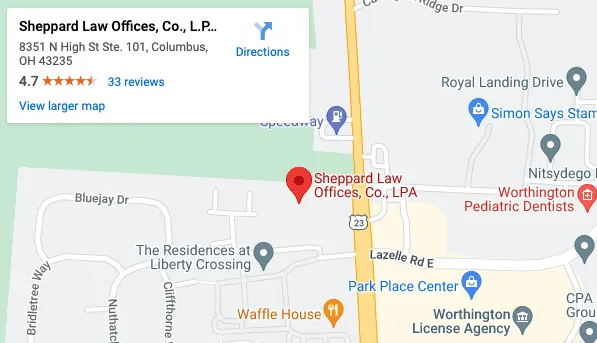Understanding the Ohio Divorce Process
Are you considering divorce and wondering what the divorce process in Columbus, OH will be like? Deciding to file for a divorce is one of life’s most difficult decisions. By working with our skilled Columbus divorce attorney, you can have the support you need to navigate the process and work toward a positive resolution.
At Sheppard Law Offices, we are dedicated to helping our clients protect their interests when going through a divorce. To get the process started or find out more about what we can do to help, contact our law office and schedule a free consultation today.
Why Do I Need a Divorce Attorney in Ohio?
Divorce is one of the most stressful experiences someone can endure. Oftentimes, you must juggle emotions with family and financial concerns. If you have questions about what to expect throughout the divorce process, our credible Columbus divorce lawyers are ready to help.
At Sheppard Law Offices, we are committed to:
- Using our extensive experience and resources to handle all types of divorce cases in Ohio.
- Preparing and completing the required paperwork for the marriage dissolution or the divorce petition.
- Helping you understand the laws of divorce in Ohio and how you can start the process.
- Protecting the rights of our clients, especially in moments of emotional vulnerability.
- Helping you and your spouse resolve what can end up being life-changing decisions in areas such as child custody and visitation, marital property division, and spousal support.
- Helping you in situations where you need third-party mediation, aggressive negotiation, or representation at trial.
Regardless if your divorce involves high assets, alimony, child support, child custody, or other highly emotional and contestable issues, we got you covered. For effective legal advice and counsel before and during divorce, schedule a free consultation with our qualified Ohio family law attorneys today.
What is the Divorce Process in Ohio?
Divorce doesn’t happen overnight. The process can be expensive and time-consuming. Every state has its own rules and procedures for divorce. Our knowledgeable Columbus divorce attorney can help you learn what to expect in the divorce process and how you can avoid a prolonged and costly divorce.
The divorce process allows the spouses to ask the court to make the final decisions concerning property division, spousal support, and matters concerning the children. Every divorce case is unique, but there are several steps everyone should consider. Here’s what you need to know about getting a divorce in Ohio.
Make Sure You Meet the Requirements For Divorce in Ohio
Before filing for divorce, you must meet the state’s residency requirements. To divorce in Ohio, the plaintiff’s spouse must have been a resident of the state for at least six months immediately before filing the complaint.
The state residency requirements prevent one spouse from filing in a location far from the other just to make it more difficult for the other spouse to respond and participate. In addition, these requirements will prevent one spouse from moving to another state to look for a judge or court that will view the case more favorably for that spouse. If you or your spouse are serving in the military, you may file where you are currently stationed. However, certain rules protect active duty service members from civil lawsuits and military divorces.
File the Divorce Petition
Before any couple can begin the divorce process, whether both spouses agree to the divorce or not, one spouse must file a divorce petition asking the court to legally end the marriage. Our top-ranking divorce lawyer in Columbus, OH can help you prepare the necessary paperwork.
Once you have the petition completed, you’ll need to bring it to your local court, along with any other required documents, and pay the filing fee. The filing spouse must include the following information:
- a statement that informs the court that at least one spouse meets the state’s residency requirements for divorce
- each spouse’s personal information (name, address, social security number)
- whether the couple has minor children, and if so, each child’s information
- a legal reason—or grounds—for the divorce
- the filing spouse’s requests for property division, child custody, child support, and/or alimony.
When you are ready to move forward with the divorce process, you’ll have to decide whether to file a petition asking for a fault divorce or a no-fault divorce.
No-Fault Divorce
Ohio is primarily a no-fault divorce state, though it also recognizes fault divorces. A no-fault divorce means that you don’t have to prove that your spouse did something that caused a breakdown in your marriage. Instead, you must prove that:
- You and your spouse are no longer compatible
- You and your spouse lived separate and apart for at least one year
Fault Divorce
By contrast, a fault divorce means that you are placing blame on your spouse for the end of your marriage. The grounds for a fault divorce in Ohio are:
- Abandonment
- Adultery
- Alcohol abuse
- Bigamy
- Cruelty
- Fraudulent contract
- Imprisonment
- Receiving a divorce outside of Ohio
Request for Temporary Court Orders
Ohio courts understand that the waiting period for a judge to finalize a divorce is not practical in every situation. For a stay-at-home parent who is raising children and dependent on his or her spouse for financial support, waiting for 6-months for the judge to finalize the divorce probably seems impossible. In this case, the court may allow you to request temporary orders regarding child support, child custody, and spousal support when you file for divorce.
Serve Divorce Papers To Your Spouse
Regardless of the type of divorce you choose, after you file your documents with the court, you must serve or deliver a copy of the paperwork to your spouse. After you’ve filed your petition and served your spouse, the court will schedule a final hearing between 30 and 90 days from the date of filing. If you failed to serve your spouse, or if you neglect to file a proof of service with the court, the judge cannot proceed with your divorce case.
Wait for a Response
The spouse who receives the paperwork must file an answer or reply to the divorce petition within a given time frame. If your spouse responds to the complaint, the court must proceed with the traditional divorce proceedings. Failure to answer or respond could result in a default judgment against the non-responding spouse.
Negotiate a Settlement
Throughout the divorce process, settlement is the most common resolution to a case. In situations where the parties involved have differing opinions on important topics, like child support, property division, or child custody, both spouses will need to work together to reach an agreement.
Depending on the circumstances of the case, the court may schedule a settlement conference. This conference allows both parties and their attorneys to meet and discuss the status of the divorce case. The sooner a settlement is reached, the less expensive the divorce is, and the sooner both parties can carry on with their new lives.
Furthermore, the court may schedule mediation. This is the process where a mediator or a neutral third party will help facilitate discussion between the spouses to resolve existing family issues. Mediation can be beneficial for many divorcing couples because it saves significant time and money during the divorce process.
Divorce Trial
If you are not able to agree on the matters related to the divorce, then you could end up going to trial. During the trial, you’ll need to present evidence, possibly including testimony from witnesses, so the judge can decide a property settlement for you. It will be easier if you’re represented by a competent Columbus OH divorce attorney.
At trial, both your attorney and your spouse’s attorney will be able to put on evidence to show that your demands should be granted. If you are unhappy with the outcome of the trial, you may be able to appeal or modify a divorce judgment.
Finalize the Judgment
If you and your spouse have agreed on all the issues, the judge will read your written agreement and confirm it is acceptable under Ohio law. To finalize your divorce, the judge will approve and sign a “Decree of Divorce.” The decree will include the details of your divorce, such as property division, child custody, and spousal support. Your divorce is final as of the date the judge signs the decree.
Call Our Seasoned Columbus Divorce Lawyer Now!
No matter the circumstances, divorce can be a daunting process. After all, you have to navigate a complicated legal process in addition to emotional and financial challenges. While we understand that divorce is never easy, our experienced Columbus OH divorce lawyers at Sheppard Law Offices are committed to working closely with you to make the process less stressful and emotionally draining.
Our family law firm has decades of experience guiding clients through the divorce process. We can ensure you have advocates in your corner who can help you understand your rights, options, and how to best navigate your legal journey. We will work to protect your legal rights and help you reach a fair and timely resolution of any divorce disputes.
If you have questions about divorce and how we can help, schedule a free consultation with our trusted Ohio family law attorneys now.


